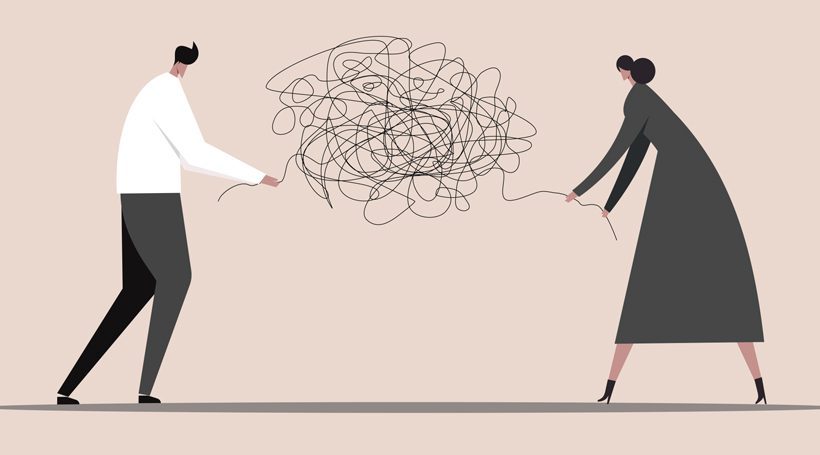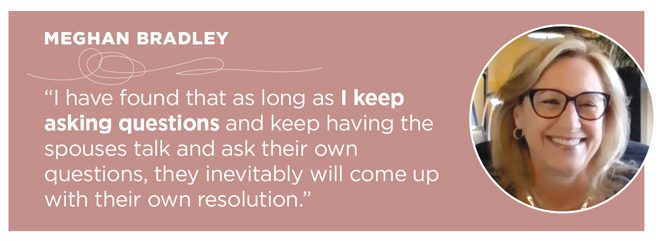presented by
What happens during a divorce will have a significant impact on families for many, many years to come. But the process of laying the groundwork for the future isn’t always easy, mainly because emotions are usually in play. We spoke with some South Jersey legal and mediation experts to discover how couples can find common ground, even when it seems impossible.
Participants:
Karen Karpousis, Charny, Karpousis, Altieri & Donoian
Hon. Marie Lihotz (ret.), Archer & Greiner
Michael Weinberg, Weinberg, Kaplan & Smith
Lynda Hinkle, The Law Offices of Lynda L. Hinkle
Roseann Vanella, Advanced Mediation Solutions
Meghan Bradley, DeLorenzo Bradley & Banfe
Bruce Matez, Weir Greenblatt Pierce
Melissa Fecak, South Jersey Divorce Solutions
A myth about mediation
Couples think they have to be in agreement before coming to mediation. And it’s just not true. The most important thing is that they’re committed to the process and they’re willing to work together in good faith to negotiate with the assistance of the mediator.
Roseann Vanella
A myth is that in mediation there is no full disclosure, there is no discovery. Most of the time, that is not true. People may go into mediation thinking, “Oh, I’ll be able to hide this asset.” That’s not the purpose of mediation. It’s more of an alternative dispute resolution tool, but there should still be full disclosure.
Karen Karpousis
People sometimes think the mediator is going to get the other spouse on their side. I try to explain that my role is to be neutral. I’m not here to force the other spouse to agree with you. That’s not what a mediator does.
Melissa Fecak
A lot of people believe that once they’re in the battle of litigation, they can’t go to mediation, but these two mediums can work in tandem. A lot of people can even get a break, and the court will grant them two weeks to try mediation and see if they can resolve anything. Then the trial can start shortly thereafter.
Hon. Marie Lihotz
People sometimes have a misunderstanding of the role of the mediator. They confuse arbitration and mediation. They think the mediator has decision-making power or can provide them with legal advice, neither of which is true. The role of the mediator is to be a neutral third party to facilitate negotiation and resolution, not to give legal advice and not to make decisions for the parties.
Michael Weinberg
Benefits of Mediation
You control your own destiny.
Karen Karpousis
You can be creative in your approach and do things a superior court judge might not be able to do given the rules and regulations that apply in matrimonial law. In mediation, if both parties are willing to be flexible, you might have a result that is different than what a court might be empowered to do.
Michael Weinberg
In mediation, the couple decides the outcome of their entire divorce agreement, everything. We don’t move forward until the couple has agreed – nobody is forcing anybody to come to an agreement. The couple makes all the final decisions. It’s empowering for them.
Roseann Vanella
The benefits of mediation are threefold: Participants control the outcome, they aren’t beholden to dates imposed by other people, and they have a lot of time to review documents, discuss the issues and really get into the heart of the issues.
Meghan Bradley
A fair outcome
I tell this to clients all the time, your view of what is fair, and someone else’s view of what is fair, and my view of what is fair may be three different versions of fairness. In mediation, I’m always trying to help strive towards getting some blend of fairness, because the only person who really gets to decide what is fair in a divorce is a judge after a trial. That’s what we’re trying to avoid in this process.
Bruce Matez
The people who decide the outcome are the individuals who are there to mediate. They decide what they’re going to accept. They decide if they’re going to put up roadblocks or they decide if they’re going to make this work no matter what. Fair is when they come out with what they really need, whatever that is, and maybe even some of the things they want.
Lynda Hinkle
The difference between traditional divorce and mediation
In mediation, the parties get to control the process, whether it’s choosing the mediator, choosing the timing or what topics are discussed. When you’re going through traditional litigation, it’s the court that schedules and you really don’t have a say.
Karen Karpousis
It’s one size fits all in the court system. In mediation, everything should be tailored to the needs of the people who are mediating, as opposed to what the court’s needs are.
Bruce Matez
In litigation, there’s always going to be a certain amount of proving the other person’s position is wrong. In mediation, it doesn’t have to be that way. It can be: No one’s wrong, let’s get to a resolution.
Lynda Hinkle
I have a creative background, and mediation gives us the ability to use creativity to come up with the best solution that will fit this particular family. A judge is going to do X, Y or Z. They’re going to try to put that round peg into a square hole. We look at what this family needs and find the best solution for them.
Melissa Fecak
The court only has so many minutes. But family judges, in particular, are often disrupted by other emergent matters they have to address. If you’re in court, you could be there eight hours in a day, and perhaps only get to present your issues in your case for half that time. It’s a difficult process. Mediation is more relaxed. People can be candid and forthright and discuss their goals and what they really want.
Hon. Marie Lihotz
When infidelity is involved
The reality is that fault, such as infidelity, is not a factor that the court considers when determining economic issues. I have to decide how I relay that message to my client, because I don’t want to appear insensitive – his or her life may have just fallen apart. But pretty early on, I need to make clear that type of marital fault will not be considered when determining equitable distribution, child support or alimony.
Michael Weinberg
The infidelity issue probably sparks the most problematic portions of the case. There could be issues raised of dissipation of assets if someone spent money on their paramour. It unfolds a lot of layers and issues that the party who feels they were wronged doesn’t want to let go of. That can cause a lot of difficulties.
Hon. Marie Lihotz
When a client has had their spouse commit infidelity, and now they have to pay out, I think that’s the most painful conversation in the world to have. There ought to be some kind of remedy in our system for that, because it’s hard to ignore the emotional unfairness.
Lynda Hinkle
When infidelity is involved, it tends to be a very emotional issue, more emotional than even financial issues. Often the spouses are coming to mediation at different levels of readiness. I find that sometimes the mediation process needs to have a slower pace – that doesn’t necessarily mean it’s going to cost more. It’s just going to take more time for the spouse who has been hurt to be able to think clearly and make business decisions rather than emotional decisions.
Meghan Bradley
What makes a good mediator
A mediator has to be patient and be able to listen. Often, someone may raise an argument that is unreasonable. But you would never say, “Hey, that’s ridiculous. Let’s not even talk about that.” The mediator has to frame it in a way that gets the party to look at things in a different way. That’s a challenge. And that’s where the negotiation skills and creativity come in. We are trying to get everyone to see things from a different angle.
Hon. Marie Lihotz
A good mediator needs a strong enough personality to make everyone in the room feel safe to have the conversations that need to happen – to make everyone feel their opinion is important, even as you’re telling them that maybe their opinion isn’t necessarily something a court would agree with.
Lynda Hinkle
A good mediator is very good at listening, so he or she can be very good at asking questions. I have found that as long as I keep asking questions and keep having the spouses talk and ask their own questions, they inevitably will come up with their own resolution. It’s always gratifying to see that happen.
Meghan Bradley
How to have a successful mediation
Compromise. Not only should they compromise, they have to compromise. Mediation doesn’t work without compromise.
Bruce Matez
Couples need to understand that it’s not their friend’s divorce or their sister’s divorce. It’s their situation, their family. So it’s critical for them to be making decisions that are based upon their needs. Once a couple keeps that in the forefront of their minds, they can move forward with great success.
Roseann Vanella
They shouldn’t arrive with extremely unreasonable expectations. They shouldn’t think, “Oh, my spouse was a real jerk, so I get everything.” That’s not realistic. Be willing to listen to what the other side is saying.
Melissa Fecak
I ask couples to identify their goals for mediation and stick to them. I also ask them to help me identify issues, and then do their homework and discuss as much as they need to discuss to come to a resolution. So preparation, preparation, preparation is really key.
Meghan Bradley
Deciding parenting issues
I always recommend parents take a step back and listen to what the other party is vocalizing and what their concerns are. How can we reach an agreement that will take that into consideration, and still take into consideration what you want also? This is between you and your partner. This isn’t what your mother wants or what your best friend thinks is fair. You know what is best for your children. That’s what you should focus on.
Karen Karpousis
Custody statutes are written in a gender-neutral way, so gender should not play a role in the allocation of custody or parenting time. And just because you have heard that 50/50 parenting time is what everybody gets, that may or may not be appropriate for your case. But most people who go through a divorce want to make sure the children come out unscathed.
Michael Weinberg
If you can convince parents to work together – and that’s what we try to do – and they try to develop very broad, structured rules together, then that makes the parenting time and custody discussions easier. Because flexibility in parenting is key. Not everybody can always commit to the same parenting time, every single week, 52 weeks a year, every year. There are things that come up, emergencies, opportunities and they have to be dealt with. You can’t have the other side say, “Too bad. It’s not your day.” Mediation helps a lot with having open discussions about what’s best for your children.
Hon. Marie Lihotz
In any conflict situation around custody, I’m going to suggest those children have an opportunity to have some kind of counseling, because they’re sensing what’s going on, particularly older children. I also encourage people with older children to have sensitive, loving – not accusatory – conversations about what they want, because particularly teenagers are going to have an opinion, and their opinions should be factored in, especially in mediation. They should have some say on how their lives are going to be structured. That’s a big pet peeve of mine, kids are left out of this process way too much.
Lynda Hinkle
Signs mediation may not work
In cases where domestic violence is present, mediation can be difficult. I’ve done the domestic violence training for mediation and it can work, but it does require a different way of approaching mediation. And if someone has alcohol or addiction issues, that’s going to make it difficult. But in mediation, we can say, “Ok if that spouse is willing to get treatment, we can suspend mediation until they’re healthy and able to participate.”
Melissa Fecak
I don’t often see signs where I think mediation won’t work. Some mental health issues can make it very difficult to get to a resolution. In those cases, I can convince spouses to seek counsel.
Meghan Bradley
If anybody is cognitively impaired, whether it’s a mental illness or substance abuse, mediation is definitely not right. You need to be able to advocate for yourself in mediation, to think clearly and process information. The other big red flag is if your spouse is a bully to the point that it intimidates you. You won’t be able to contribute to the mediation and make decisions if you’re worried about the reaction.
Roseann Vanella
Compelling trust is a big issue going into mediation. If I represent an economically dependent spouse married to a self-employed businessman, and there are concerns of hidden assets, that may not be an appropriate case for mediation initially. Mediation may be appropriate down the road, once we’ve conducted traditional discovery with a court acting as a safeguard to make sure my client gets access to necessary financial documentation. I wouldn’t rule out mediation in that case, I just might not mediate initially.
Michael Weinberg
If years after mediation, someone changes their mind
There is a mechanism in the law that anytime there is a change in circumstances regarding minor children or things like financial issues in relation to college support, that can be revisited in the future. And the suggestion is they go back to mediation before the court system. The only thing that really can’t be changed legally is the equitable distribution of assets and debt.
Bruce Matez
If you didn’t get the toaster the first time around, you can’t come back five years later and say, “Now I want the toaster.” But if there is a change in parenting – if the kids were 5 when you made the agreement and now they’re 12 – you may need to make some tweaks to the parenting plan. I always recommend parents put into the agreement that they can return to the mediation table to try to resolve those issues.
Melissa Fecak
You can always reopen custody or child support if there’s a change of circumstances. But be prepared for the fact that nothing will be changed because you’ve decided you no longer like the arrangement.
Lynda Hinkle
I encourage spouses to put into their initial agreements that before they do anything, they’ll come back to mediation. Spouses who have had success resolving their case initially in mediation should have optimism they can do it again. They’ve already done it once.
Meghan Bradley
What surprises clients about the mediation process
Clients are surprised they were able to finish the process in a way that didn’t feel threatening or ugly to either one of them. That’s a great feeling for me.
Roseann Vanella
When you discuss these issues, people get angry and upset and frustrated. They get hurt, and people cry. Sometimes they raise their voice. They might pound their fist on the table. People are surprised by how difficult mediation can be, because of the emotions that come up.
Bruce Matez
People are surprised that in mediation, you’re not going to resolve a 50-issue case in one session. We’re going to break it down, and I may send you home with homework. They’re sometimes surprised that it’s most likely not going to be resolved in two hours.
Karen Karpousis
A lot of times people are surprised if they have to address the other party or they may be surprised by the tone the other person takes.
Hon. Marie Lihotz
They’re often surprised that, as the mediator, I don’t represent either party. And technically, I can’t give legal advice to either party.
Michael Weinberg
Advice for resolving any dispute
When the other side is talking, try not to take it personally. Objectivity is one of the most important skills in negotiation.
Hon. Marie Lihotz
The first thing you have to do is take your emotions and put them in check. I’m not saying shut them off or change them but control them.
Roseann Vanella
Be open-minded and be willing to be flexible.
Karen Karpousis






















